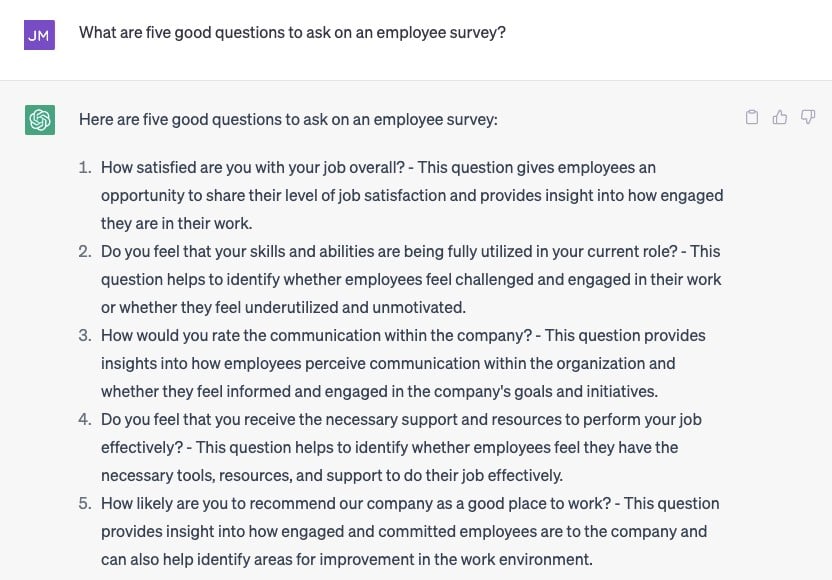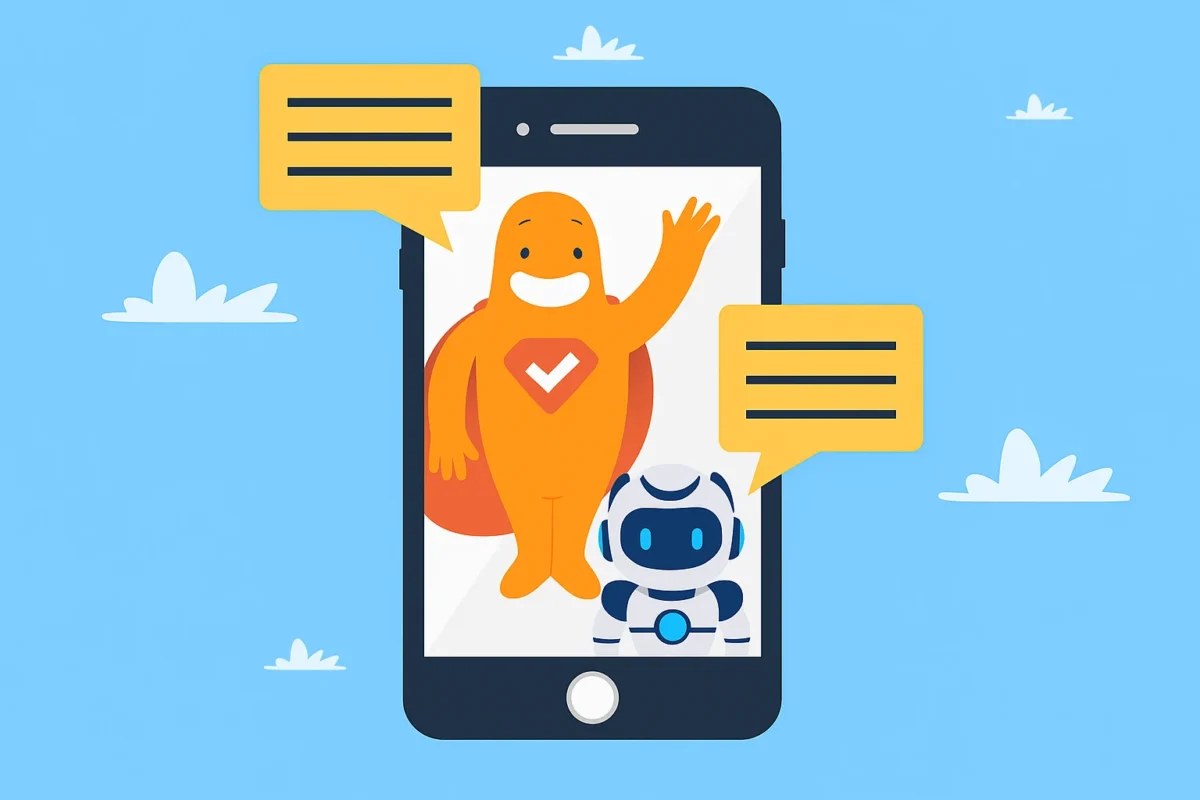Artificial intelligence surveys use AI tools like chatbots and machine learning models to create, distribute, and analyze surveys more efficiently. AI can generate survey questions, streamline workflows, and uncover insights from large datasets, helping organizations better understand customers, employees, and markets. These tools save time and reveal patterns in sentiment and behavior through automated analysis and reporting. However, AI-generated survey questions have drawbacks—such as a lack of emotional nuance, brand tone, and logic flow—making human oversight essential. When balanced with ethical practices, transparency, and data security, AI-powered surveys offer a faster, smarter, and more scalable approach to gathering actionable insights.
Create Your FREE Survey, Poll, or Questionnaire now!
4 Types of Artificial Intelligence (AI)
AI, which is broadly defined as technology that performs simple to complex tasks that once required human input, has four classifications. As of now, only two are a reality.
1. Reactive AI
This is the simplest form of artificial intelligence. With this model, a machine is programmed to provide an output based on the input it receives. This output is consistent, and no learning takes place on the part of the machine. Examples include chess-playing computers, email spam filters, and even movie recommendations on Netflix or music suggestions on Spotify.
2. Limited Memory AI
This model of AI technology also uses pre-programmed input, but it learns over time and builds knowledge through observation of actions and analysis of data as well. A good example of this AI model includes self-driving cars, which observe road conditions, traffic signals, other vehicles, and so on in order to make decisions.
Another example is chatbots. You’re familiar with predictive text on your smartphone, which guesses what words will come next based on the words you’ve already inputted. Chatbots are like predictive text on steroids, generating responses to questions with often startlingly natural language. AI for marketing and research is becoming more and more common, so we’ll talk more about this in a moment!
3. Theory of Mind AI
While not here yet, but likely on the horizon, this form of AI will be highly intelligent and able to hold meaningful conversations with humans. In theory, it will be able to understand and remember emotions as well, adjusting its behavior accordingly when interacting with humans.
4. Self-Aware AI
This is the type of AI that Hollywood loves to feature in movies, though at this time, it is just a concept. This form of AI would come to exist when machines develop their own emotions and obtain a level of consciousness and intelligence similar to humans.
Create Your FREE Survey, Poll, or Questionnaire now!
Artificial Intelligence Surveys
When writing about limited memory AI, we mentioned chatbots. While most people think of chatbots as the bot or “person” at the bottom of a webpage or help screen that can answer, in a human fashion, pretty standard questions, today’s chatbots have really leveled up thanks to innovations like ChatGPT.
For the best description of ChatGPT, here’s a definition from ZDNet:
“ChatGPT is a natural language processing tool driven by AI technology that allows you to have human-like conversations and much more with the chatbot. The language model can answer questions and assist you with tasks, such as composing emails, essays, and code.” These AI models are trained on vast datasets and expert knowledge to improve their accuracy and relevance.
So how does it work? Users type in a question, and ChatGPT responds based on the limitless knowledge that is available to it through the internet; it also learns how well it did by user feedback, so it can improve answers in the future.
In the screenshot below, you’ll see my ChatGPT query and its response (I must say, there’s no arguing with that answer).
In addition to gathering content as in the example above, some marketers and researchers are using chatbots like ChatGPT to develop AI survey questions. These tools are often part of a comprehensive survey platform that streamlines the creation, distribution, and analysis of surveys. Below, the AI is asked to give me five employee survey questions.
AI-powered platforms also provide access to valuable resources for survey design, policy navigation, and data analysis.
When using AI to generate survey questions, you can take advantage of a variety of question types, such as scale and ranking questions, which help gather detailed feedback.

Create Your FREE Survey, Poll, or Questionnaire now!
Pretty neat, right? While using ChatGPT or other chatbots to create survey questions can certainly be a time-saver, there are some disadvantages. AI tools can also help ensure that survey questions and flow make logical sense, improving the overall survey experience. Let’s take a look.
Benefits of Surveys
Surveys are a game-changer for organizations looking to validate ideas, drive growth, and gain deep insights into their audience. By leveraging artificial intelligence in survey creation and analysis, businesses can tap into a wealth of survey data with less effort than ever before. AI-powered surveys make it easier to create, distribute, and analyze surveys, allowing companies to quickly gather high-quality data from customers, employees, and students.
With AI, surveys can uncover patterns, attitudes, and perspectives that might otherwise go unnoticed, helping organizations understand their audience on a deeper level. This enhanced understanding enables businesses to make informed decisions, improve products and services, and ultimately drive growth. Whether you’re looking to capture feedback, test new ideas, or monitor employee engagement, surveys powered by artificial intelligence provide the knowledge and insights needed to stay ahead in today’s fast-paced world.
Survey Applications
Surveys are incredibly versatile and can be applied across a wide range of industries and use cases. In marketing, surveys help capture customer feedback and understand demographics, enabling businesses to tailor their messaging and offerings. Product development teams use surveys to gather open-ended responses and multiple-choice data, ensuring new products meet customer needs and expectations. To maximize their effectiveness across these applications, it’s important to conduct survey testing before distributing surveys, as this can improve data quality and the insights derived from them. In customer service, surveys provide valuable insights into satisfaction levels and areas for improvement.
AI models take survey applications to the next level by generating open-ended responses that deliver rich, qualitative data. This allows organizations to understand not just what customers think, but why they feel that way. Surveys can be customized for any purpose—whether it’s a quick pulse check with a few multiple-choice questions or a comprehensive research project with in-depth, open-ended answers. No matter the application, surveys remain a powerful tool for capturing insights, understanding customers, and driving growth.
Survey Tools and Software
Choosing the right survey tool or software is essential for collecting and analyzing survey data effectively. Today, there are a variety of platforms available, ranging from simple, free survey builders to advanced, AI-powered solutions. Tools like SurveyMonkey offer robust features, including AI-powered survey creation and analysis, making it easy to generate questions, automate workflows, and gain actionable insights.
Platforms such as Build with AI allow users to create surveys from scratch, using prompts to generate questions and automate the entire survey process. When selecting a survey tool, it’s important to consider features like security, quality, scalability, and the ability to handle large volumes of data. Look for platforms that offer reliable analysis, customizable templates, and strong data protection measures. By leveraging the right survey software, organizations can streamline survey creation, ensure data quality, and deliver high-impact insights with minimal effort.
Survey Security and Ethics
As organizations increasingly rely on AI to collect and analyze survey data, ensuring survey security and upholding ethical standards is more important than ever. Protecting respondents’ privacy and maintaining the integrity of survey results should be top priorities. This means implementing strong security measures, such as encryption and controlled access, to safeguard sensitive data throughout the research process.
Transparency is also key—respondents should be informed about how their data will be used and what steps are taken to protect their privacy. Ethical survey practices build trust, encourage honest responses, and ensure the quality and validity of the data collected. By prioritizing security and ethics, organizations can confidently use AI-powered surveys to gather valuable insights while respecting the rights and expectations of their respondents.
Survey Analysis and Reporting
The true value of a survey lies in how its data is analyzed and reported. With the help of AI models, survey analysis becomes faster, smarter, and more insightful. AI-powered tools can quickly process large volumes of survey data, identifying key themes, patterns, and sentiment that might be missed through manual analysis. This allows organizations to understand customer attitudes, employee engagement, and market trends with greater accuracy.
Automating the reporting process with AI not only saves time but also delivers clear, visual summaries of survey results, making it easier to share findings and drive action. Whether you’re looking to uncover hidden insights, track changes over time, or inform strategic decisions, AI-powered survey analysis and reporting provide the depth and clarity needed to support growth and innovation. By leveraging advanced models and analysis techniques, businesses can transform raw survey data into meaningful, actionable insights.
5 Disadvantages of AI Survey Questions
AI chatbots can be very useful, but may prove to be problematic in some situations. For example, in education settings. In a recent survey, a number of teachers stated that students are using ChatGPT to cheat on tests and complete their homework assignments. But for this blog, we’ll focus on artificial intelligence for surveys, where there are also potential drawbacks.
Despite the convenience of using a chatbot to create AI survey questions, marketers and researchers should be aware of the following five disadvantages of artificial intelligence survey questions.
1. Using the Wrong Voice or Tone
While an AI chatbot may be able to put together survey questions for you, the questions likely will not reflect a brand’s personality (for example, if you’re known as a “fun” retailer, with quirky messaging, AI-generated questions may sound very basic and/or serious). This sort of disconnect can be off-putting for many survey takers.
2. Lack of Emotion
Some surveys require human understanding. For example, if you’re conducting a survey on a sensitive topic and don’t word things just right, or fail to show empathy in your questions, you could upset or insult people. Either way, this will make them drop out of the survey and lower your response rates.
3. Lack of Survey Logic
Survey logic flows are what allow you to create “smart surveys” that intelligently react to respondents’ answers. With logic flows, each answer a participant gives can trigger a different consequence; for example, if they answer “No” to a question, they’ll be taken to a different set of questions than someone who answered “Yes.”
Simply using AI survey questions as the machine generates them and placing them into your survey as-is means there is no survey logic. This can lead to respondents being asked questions that don’t apply to them or contradict their previous statements.
Create Your FREE Survey, Poll, or Questionnaire now!
4. Introduction of Survey Bias
While survey bias can easily be introduced into questions written by humans, it can also be introduced into AI survey questions (after all, the AI learns from us). So, it’s important, if using AI survey questions, to weed out any that include a form of survey bias, such as leading or loaded questions, absolute or unclear questions, or double-barreled and multiple-answer questions.
5. Lack of a Human Touch
Chatbots, as a form of limited memory AI, don’t comprehend emotion (sure, they can be pre-programmed to understand when someone is angry based on their word choice, but may not respond appropriately).
While a chatbot may be able to draft an initial series of questions, it often won’t be able to create follow-up questions based on responses. So, if you send out an AI-generated customer experience survey and the respondent is very negative, you’ll still need to address their issues on your own in a follow-up survey that has a human touch the AI doesn’t possess.
Conclusion
Whether to conduct a survey using AI-generated questions is best left to the individual or company creating the survey. Obviously, using AI survey questions can save time, money, and even raise questions the researcher or marketer hadn’t thought of. However, AI-generated questions can also be problematic, lacking a human touch, emotion, and survey logic, while potentially using the wrong voice or tone and introducing bias.
When using AI for research or marketing surveys, use it simply for brainstorming and to generate ideas. Then, craft your own questions. AI is best used to enhance your efforts, not eliminate all effort.
Whether you’re creating an AI survey or crafting your own questions, you can use SurveyLegend to build them. Our online survey maker creates gorgeous and secure surveys, and allows you to include a wide variety of types of questions, even including survey pictures. SurveyLegend also offers an app for creating and managing surveys on the go, with features designed for mobile convenience. Start today for free!
AI-powered surveys are increasingly used in university research and academic studies, supporting a wide range of scholarly projects.
How do you feel about chatbots for surveys? Have you ever used ChatGPT? Will you use it in the future? Let us know in the comments!
Create Your FREE Survey, Poll, or Questionnaire now!
Frequently Asked Questions
What is artificial intelligence?
Artificial intelligence, or AI, is an overarching term for technology that can perform simple to complex tasks that once required human input. More advanced AI can simulate human behavior.
What are the four types of artificial intelligence?
1. Reactive AI
2. Limited Memory AI
3. Theory of Mind AI
4. Self-Aware AI
What is a chatbot?
A chatbot is a form of artificial intelligence that simulates human conversation through programmed data and machine learning. It is typically used by companies in place of a live human. Other Times, the chatbot answers basic questions and then transfers users to a live human as the questioning escalates.
What are artificial intelligence surveys?
An AI survey is created using chatbots to develop survey questions. While this can save time, money, and generate ideas, it can also lead to surveys that lack a human touch, emotion, or logic, or introduce survey bias or the wrong voice and tone.



